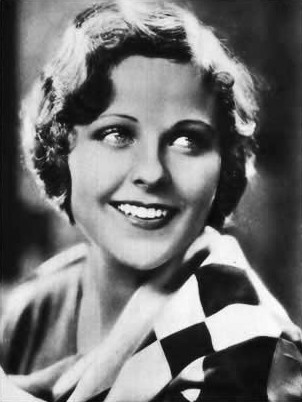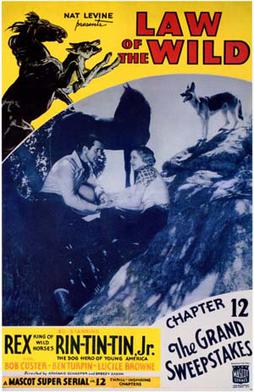Plot
This article needs a plot summary.(November 2022) |
| No Man's Law | |
|---|---|
No Man's Law. | |
| Directed by | Fred Jackman |
| Written by | Frank Butler |
| Story by | F. Richard Jones |
| Starring | Rex the King of Wild Horses Barbara Kent James Finlayson Oliver Hardy Theodore Von Eltz |
| Cinematography | Floyd Jackman George Stevens |
| Edited by | Richard Currier |
| Distributed by | Pathé Exchange, Inc. |
Release date |
|
| Country | United States |
| Language | Silent with English intertitles |
No Man's Law is a 1927 American silent Western film starring Rex the King of Wild Horses and featuring Oliver Hardy as a lustful villain.
This article needs a plot summary.(November 2022) |

The Hollywood Revue of 1929, or simply The Hollywood Revue, is a 1929 American pre-Code musical comedy film released by Metro-Goldwyn-Mayer. It was the studio's second feature-length musical, and one of their earliest sound films. Produced by Harry Rapf and Irving Thalberg and directed by Charles Reisner, it features nearly all of MGM's stars in a two-hour revue that includes three segments in Technicolor. The masters of ceremonies are Conrad Nagel and Jack Benny.

The Music Box is a Laurel and Hardy short film comedy released in 1932. It was directed by James Parrott, produced by Hal Roach and distributed by Metro-Goldwyn-Mayer. The film, which depicts the pair attempting to move a piano up a long flight of steps, won the first Academy Award for Best Live Action Short (Comedy) in 1932. In 1997, it was selected for preservation in the National Film Registry by the Library of Congress as being "culturally, historically, or aesthetically significant". The short is widely seen as the most iconic Laurel and Hardy short, with the featured stairs becoming a popular tourist attraction.

Oliver Norvell Hardy was an American comic actor and one half of Laurel and Hardy, the double act that began in the era of silent films and lasted from 1926 to 1957. He appeared with his comedy partner Stan Laurel in 107 short films, feature films, and cameo roles. He was credited with his first film, Outwitting Dad, in 1914. In most of his silent films before joining producer Hal Roach, he was billed on screen as Babe Hardy.

The Circus is a 1928 silent romantic comedy film written, produced, and directed by Charlie Chaplin. The film stars Chaplin, Al Ernest Garcia, Merna Kennedy, Harry Crocker, George Davis and Henry Bergman. The ringmaster of an impoverished circus hires Chaplin's Little Tramp as a clown, but discovers that he can only be funny unintentionally.
Backstage most commonly refers to backstage (theatre), also in motion picture and television production.

Love 'em and Weep is a 1927 American silent comedy short film starring Mae Busch, Stan Laurel and James Finlayson.

Lawrence Semon was an American actor, director, producer, and screenwriter during the silent film era. In his day, Semon was considered a major movie comedian, but he is now remembered mainly for working with both Stan Laurel and Oliver Hardy before they started working together.
In film, nudity may be either graphic or suggestive, such as when a person appears to be naked but is covered by a sheet. Since the birth of film, depictions of any form of sexuality have been controversial, and in the case of most nude scenes, had to be justified as part of the story.

Barbara Kent was a Canadian film actress, prominent from the silent film era to the early talkies of the 1920s and 1930s. In 1925, Barbara Kent won the Miss Hollywood Beauty Pageant.

The Wizard of Oz is a 1925 American silent fantasy-adventure comedy film directed by Larry Semon, who also performs in the lead role as a Kansas farmhand and later in the story disguised as the Scarecrow.

Film Booking Offices of America (FBO), registered as FBO Pictures Corp., was an American film studio of the silent era, a midsize producer and distributor of mostly low-budget films. The business began in 1918 as Robertson-Cole, an Anglo-American import-export company. Robertson-Cole began distributing films in the United States that December and opened a Los Angeles production facility in 1920. Late that year, R-C entered into a working relationship with East Coast financier Joseph P. Kennedy. A business reorganization in 1922 led to its assumption of the FBO name, first for all its distribution operations and ultimately for its own productions as well. Through Kennedy, the studio contracted with Western leading man Fred Thomson, who grew by 1925 into one of Hollywood's most popular stars. Thomson was just one of several silent screen cowboys with whom FBO became identified.
Mascot Pictures Corporation was an American film company of the 1920s and 1930s best known for producing and distributing film serials and B-westerns. Mascot was formed in 1927 by film producer Nat Levine. In 1936 it merged with several other companies to form Republic Pictures.

Rex, also known as Rex the Wonder Horse and King of the Wild Horses was a 16 hands Morgan stallion who starred in films and film serials in the 1920s and 1930s.

Richard Renchaw Neill Jr. was an American actor and screenwriter who worked in both the silent and sound eras. He performed in more than 200 films from 1910 to 1959, and during the early part of his long screen career, he wrote "several scenarios" for productions. Born in Philadelphia, Pennsylvania, he died in the Woodland Hills neighborhood of Los Angeles.
Nat Levine, was an American film producer. He produced 105 films between 1921 and 1946. Born in New York City, he entered the film industry as an accountant for Metro Pictures and became personal secretary to Metro head Marcus Loew.

The phrase Wonder Horses refers to the equine companions of cowboy heroes in early Western films. What makes these horses different from others that have appeared on the silver screen is their rise from trusty steed to a genuine screen personality. A number of horses have enjoyed such fame, often receiving equal or second billing with their human costars.

Film censorship in the United States was a frequent feature of the industry almost from the beginning of the U.S. motion picture industry until the end of strong self-regulation in 1966. Court rulings in the 1950s and 1960s severely constrained government censorship, though statewide regulation lasted until at least the 1980s.

Summer Bachelors is a 1926 American silent romantic comedy film produced and directed by Allan Dwan. The film is based on the 1926 novel Summer Widowers by Warner Fabian and stars Madge Bellamy, Matt Moore, Allan Forrest, and Hale Hamilton.
Simple Sis is a 1927 American silent comedy-melodrama directed by Herman C. Raymaker and starring Louise Fazenda as a poor, plain laundress hoping for romance, supported by Clyde Cook as a shy suitor and Myrna Loy as a cruel beauty.

The King of the Wild Horses is a 1924 American silent Western film directed by Fred Jackman. It stars Edna Murphy, Rex the wonder horse, and Charley Chase. It was written and produced by Hal Roach and released through Pathé Exchange.